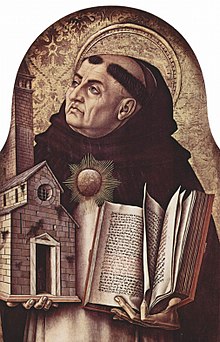Thomas Aquinas
Appearance
The "Scots" that wis uised in this airticle wis written bi a body that haesna a guid grip on the leid. Please mak this airticle mair better gin ye can. (October 2020) |
| Saint Thomas Aquinas OP | |
|---|---|
 | |
| Releegious, priest an Doctor o the Kirk | |
| Born | 28 Januar 1225[1] Roccasecca, Kinrick o Sicily |
| Dee'd | 7 Mairch 1274[1] Fossanova, Papal States |
| Veneratit in | Roman Catholic Kirk Anglican Communion Lutheranism |
| Canonised | Julie 18, 1323, Avignon, Papal States, by Pape John XXII |
| Major shrine | Kirk of the Jacobins, Toulouse, Fraunce |
| Feast | 28 Januar (7 Mairch, till 1969) |
| Attributes | The Summa theologiae, a model kirk, the sun on the chest o a Dominican friar |
| Patronage | Academics; against storms; against lichtnin; apologists; Aquino, Italy; Belcastro, Italy; beuk sellers; Catholic academies, schuils, an varsities; chastity; Falerna, Italy; learnin; pencil makers; filosophers; publishers; scholars; students; Varsity o Sto. Tomas; Sto. Tomas, Batangas; theologians.[2] |
Thomas Aquinas, OP (/əˈkwaɪnəs/; 1225 – 7 March 1274), kent as Thomas o Aquin or Aquino forby, wis an Italian[3][4] Dominican friar an priest an an gye influential filosopher an theologian in the tradetioun o scholasticism, athin whilk he is kent as the "Doctor Angelicus", "Doctor Communis", an "Doctor Universalis".[5]
References
[eedit | eedit soorce]- ↑ a b Gilby, Thomas (1951). St. Thomas Aquinas Philosophical Texts. Oxford Univ. Press.
- ↑ http://saints.sqpn.com/saint-thomas-aquinas/
- ↑ Conway, John Placid, O.P., Father (1911). Saint Thomas Aquinas. London.
- ↑ Rev. Vaughan, Roger Bede (1871). The Life and Labours of St. Thomas of Aquin: Vol.I. London.
- ↑ See Pius XI, Studiorum Ducem 11 (29 June 1923), AAS, XV ("non modo Angelicum, sed etiam Communem seu Universalem Ecclesiae Doctorem"). The title Doctor Communis dates to the fourteenth century; the title Doctor Angelicus dates to the fifteenth century, see Walz, Xenia Thomistica, III, p. 164 n. 4. Tolomeo da Lucca writes in Historia Ecclesiastica (1317): “This man is supreme among modern teachers of philosophy and theology, and indeed in every subject. And such is the common view and opinion, so that nowadays in the University of Paris they call him the Doctor Communis because of the outstanding clarity of his teaching.” Historia Eccles. xxiii, c. 9.
| This releegion-relatit airticle is a stub. Ye can help Wikipaedia bi expandin it. |
Categeries:
- Thomas Aquinas
- 1225 births
- 1274 daiths
- Fowk frae the Province o Frosinone
- Members o the Dominican Order
- 13t-century Laitin writers
- 13t-century filosofers
- Aristotelian filosofers
- Christian apologists
- Divine command theory
- Italian Roman Catholic priests
- 13t-century Roman Catholic priests
- Empiricists
- Internaitional law scholars
- Italian nobility
- Italian filosofers
- Laitin commentators on Aristotle
- Roman Catholic filosofers
- Italian Roman Catholic theologians
- Italian Roman Catholic writers
- Scholastic filosofers
- Seestematic theologians
- Varsity o Naples Federico II alumni
- Varsity o Paris alumni
- Metaphysicians
- Christian ethicists
- Dominican mystics
- Virtue ethicists
- Buirials in Toulouse
- Anglican saunts
- 13t-century Christian saunts
- 13t-century theologians
- Dominican saunts
- Medieval Italian saunts
- Doctors o the Kirk
- Releegion stubs
